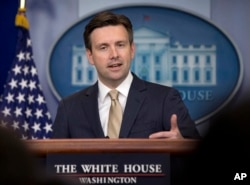U.S. President Barack Obama has been trying to win the battle against Islamic State through a combination of international diplomacy and targeted airstrikes. And U.S. officials said Wednesday the U.S.-led coalition will continue to fly over Syria.
But analysts and lawmakers differ as to whether Obama’s policies – in Syria and in other volatile areas of the world – are diluting the image of American power and credibility.
Republican Senator John McCain, an outspoken critic of Obama, said the administration’s excess of prudence in Syria has “replaced the risks of action with the perils of inaction.
“Into the wreckage of this administration’s Middle East policy, has now stepped Vladimir Putin,” said McCain, chairman of the Senate Foreign Relations Committee.
Diluting of US credibility?
But there is a consensus among some analysts that Washington is happy to let Russia get bogged down in the quagmire of the Syrian conflict.
White House spokesman Josh Earnest echoed those thoughts Wednesday.
“Russia will not succeed in imposing a military solution on Syria any more than the United States was successful in imposing a military solution on Iraq a decade ago, and certainly no more than Russia was able to impose a military solution on Afghanistan three decades ago," Earnest said.
According to Molly O’Toole of the Defense One publication, foreign policy analysts, particularly military analysts, feel that “because of the U.S. has stepped back that there has been a diluting of credibility when it comes to the American “brand” of foreign policy.”
By failing to do enough, “we allowed the forces of anarchy and opportunism to prevail,” agreed Michael O’Hanlon, a national security and defense policy analyst at Brookings.
US taking a step back
But O’Hanlon said the criticism could not be applied to other volatile areas, such as Afghanistan, Ukraine or the South China Sea.
“In broad terms, I think the criticism is unfair,” he said. Washington, said O’Hanlon, has stayed fairly resolute in Afghanistan, its rebalance towards the Asia-Pacific has been successful, and the troubles in Ukraine could not have been prevented easily because few endorsed the idea of including Ukraine in NATO.
Reva Bhalla, Stratfor vice president for analysis, agreed, saying the U.S. objective “was to take a step back,” she said. “And by doing so they were freeing themselves up to focus on other major priorities, knowing that military entrenchment there [Syria] is a pretty thankless effort after a while.”







